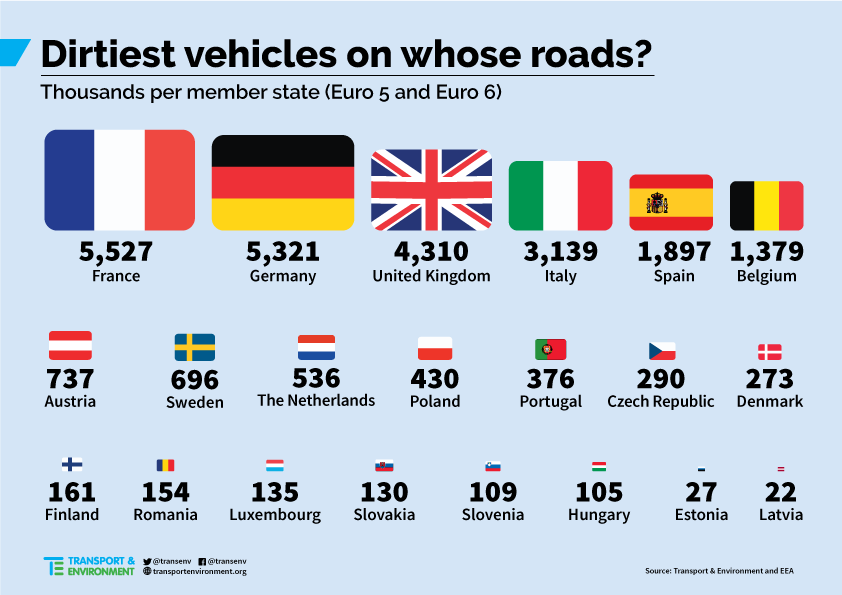
Interested in this kind of news?
Receive them directly in your inbox. Delivered once a week.
The largest number of ‘dirty’ diesels is found on French roads (5.5 million), followed by Germany (5.3 million), the UK (4.3 million), Italy (3.1 million), Spain (1.9 million) and Belgium (1.4 million).
The type approval procedure for new passenger vehicles has been criticised as an opaque system that lacks independent oversight and rigour. The current EU type approval framework sets testing standards for the 28 national authorities that approve new vehicles. The car only needs to be approved in one member state before it’s placed on the market throughout the EU and it is only that original authority that has sole power to remove that vehicle in the case of any problem. This mechanism, in place since 2007, did not prevent any car manufacturer from using defeat devices in diesel cars to cheat emission tests.
While ‘open data’ is a buzzword forcing governments and various public authorities to lay bare data for everyone to use, in the case of vehicle testing nobody can retrace where which car was approved and what procedure was applied. The system invites car manufactures to shop around and choose the most lenient authority in one of the 28 member states.
Greg Archer, clean vehicles director at T&E, said: ‘The true scandal of Dieselgate in Europe is national regulators turning a blind eye to the glaring evidence of test cheating with the sole purpose of protecting their national carmakers or their own business. This is killing tens of thousands of people annually. We need a European watchdog to stop EU member states protecting their national champions and to ensure the single market for vehicles operates in the interests of all citizens.’
European institutions are currently discussing new proposals to improve the system, the so called type approval framework regulation (TAFR). These new proposals are ‘a big step in the right direction’, said Christopher Grundler, head of the office of transportation and air quality at the US Environmental Protection Agency (EPA). He was speaking to MEPs from the VW scandal enquiry committee. However, Grundler added: ‘It is not enough to have sound standards and sound test procedures, how they are implemented in practice and the market surveillance aspects are also very, very important … that is the main challenge.’
To improve this, T&E proposes to establish strong EU oversight over the work of the 28 national type approval authorities to check if they consistently implement the EU rules. At the moment the national regulators are left to enforce the regulation in fragmented ways without anyone controlling what they do as no system of checks and balances is foreseen in the current law.
Given that around 80% of the vehicles in Europe exceed significantly the pollution limits when on the road, we need regular audits of national procedures, spot checks of cars and type approval issued, as well as dissuasive sanctions to ensure compliance with EU law.
Such re-rests can only be effective, when carried out independently from the type approval authorities. This in-use surveillance should take place over the lifetime of the vehicle to ensure proper working of emission control systems. By levying a fee of €10 on manufacturers for every new car sold, independence and efficient funding for such checks would be ensured.
Greg Archer said: ‘Testing bodies in Europe have a blatant conflict of interest as they receive the bulk of their revenues from the car companies they are regulating. This results in a race to the bottom where national regulators compete for the business of car manufacturers by offering more lax testing. Either we break this vicious link or we are bound to many Dieselgates in the future’.
Better regulation could turn EU law into a system that actually impedes cheating in cars and ensures the agreed rules are enforced. In the absence of a pan-European agency, T&E proposes to more rigorously define rules and provide detailed guidelines on how the national authorities should implement the laws. Furthermore, turning the current directive into a regulation would ensure direct application in all member states without leaving room for maneuver.


